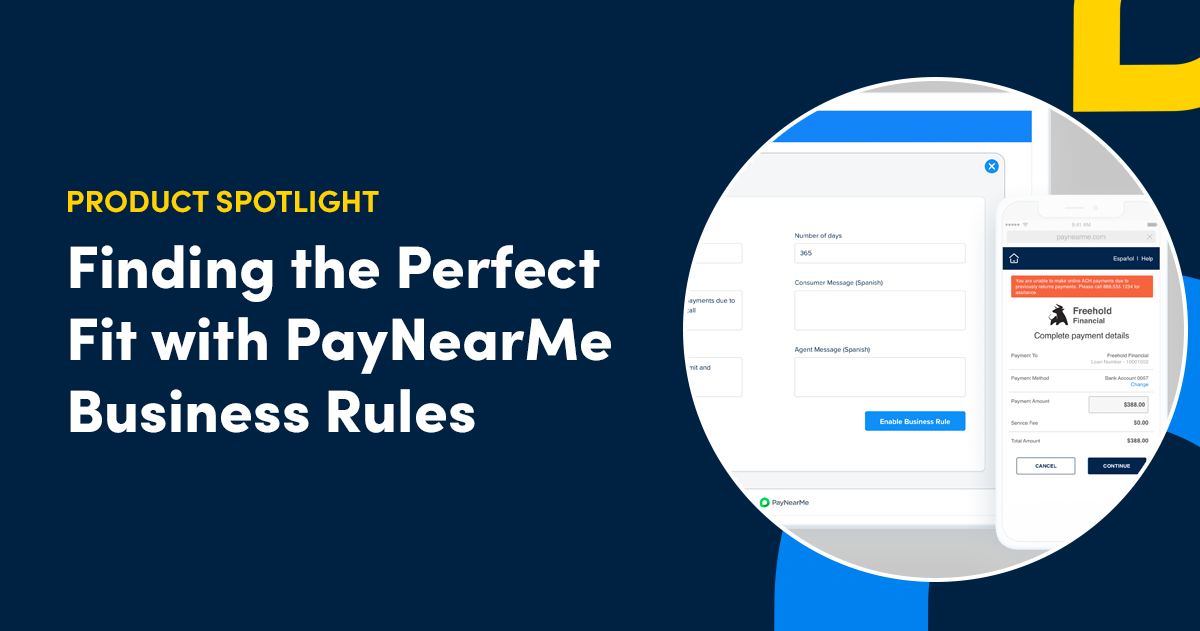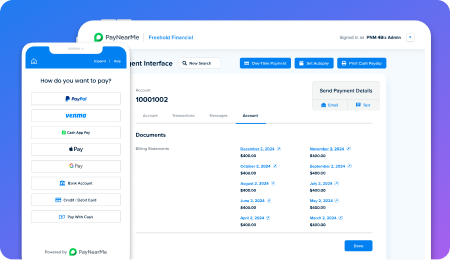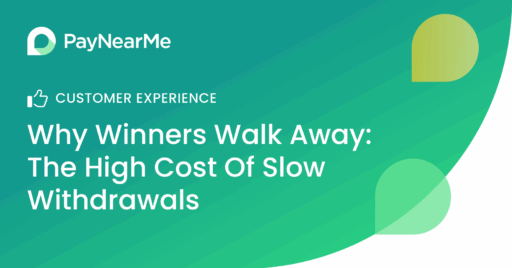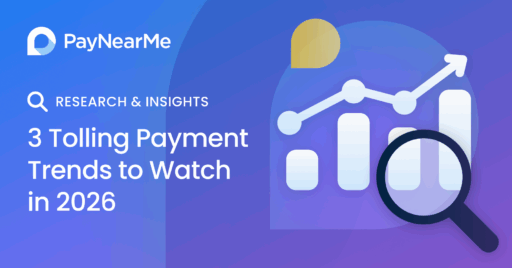Finding the Perfect Fit with PayNearMe Business Rules

Have you ever purchased something that just wasn’t quite right? Maybe you settled for a pair of pants that were a quarter inch too short, or a home you almost loved—if it only had that extra bedroom. But you compromised and purchased it anyway, despite it not living up to your original expectations.
Too often, many business owners find themselves in the same situation with software purchases. There’s an assumption that no solution can be a perfect fit. Compromises must be made. The term “good enough” starts to get thrown around before a final decision is made.
But what happens when that solution stops fitting your needs and starts creating issues? This lack of flexibility is all too common, and can have a large impact on your bottom line.
A Purpose-Built Payments Architecture
The PayNearMe bill pay platform is continuously engineered with flexibility and configurability in mind. We make customizing payment journeys simple so you can reduce customer support issues, mitigate risk and save on operating expenses.
The platform was purpose-built with bill pay in mind, with our intelligent platform architecture designed to maximize flexibility. Instead of being architected in the same way as our competitors’ systems, which start when a consumer initiates a transaction, we created a system where the biller sends something (a text, email, cash barcode) directly to the consumer. What this means, in short, is that our platform operates an “order-based” system instead of a “transaction-based” system.
The Benefits of Configurability
This order-based system is built around the consumer payments experience. It starts with an invitation to pay and it gives us the ability to build logic-based workflows that drive customer self-service and, ultimately, lead to more successful transactions.
It also allows our clients to:
- Use PayNearMe Smart Link™ technology to give customers the ability to pay how and where they want, with a consistent experience across all channels
- Get a holistic view into the customer, giving billers the ability to better manage their end-to-end payment experiences
- Apply business rules and custom parameters to deliver a tailored, “intelligent” payment experience to each and every customer, based on account history and past payment behaviors
Let’s look at some of the use cases for those business rules and how they can help you lower risk and drive higher profits.
PayNearMe Business Rules Use Cases
There are a wide range of ways to configure the PayNearMe platform to meet your businesses unique needs. Business Rules are one of the best ways. Here are a few business rule examples our current clients love:
1) Remove the ACH option / force pay with cash or debit if the customer has too many NSFs
When customers have a negative track record around paying their bills using their bank accounts (i.e. saddling you with insufficient funds errors), you can choose to put a business rule in place to remove their ACH option for a specified amount of time, or indefinitely. This will guide them to pay with a more reliable payment option (such as cash or debit) and help you lower risk and operating expenses.
Alternatively, you can make ACH payments available via call center only, allowing your agents to work with the customer to figure out the root cause of the NSF transactions.
2) Set minimum payment amounts
If your customers are habitually paying late, or don’t pay the full amount due, meaning you’re always chasing them down for late fees, it may be time to set up and enforce a “minimum amount due” rule. This will disable any amount lower than the one specified, while still allow you to accept payment amounts above what is owed—adding more flexibility than a static field that only allows the exact amount due.
3) Set maximum payment amounts
In some cases, an overpayment (e.g. overpaying the last payment on a mortgage) can lead to additional paperwork, labor and expenses for your business. This rule can help to mitigate this risk by capping the amount a customer can pay when nearing a payoff. For example, if the payment amount exceeds the total balance, or if the customer’s balance is less than X% of the loan, don’t allow a payoff online. This can allow your contact center agents to give an exact payoff amount so that the consumer doesn’t overpay.
4) Restrict how far in advance autopay and future-dated, one-time payments can be set up
Do your customers often schedule payments past their due dates, leading to late fees, low customer satisfaction and regular agent interactions? With PayNearMe Business Rules, you can set how far in advance certain customers or all of your customers across the board can make payments.
5) Only allow a certain number of payments in a certain time period. (e.g. X payments per month)
Customers may increase the chance of chargebacks and overpayments with an excess number of payments, leading to headaches and high operational costs on your end. Accidental “double” payments can also occur when a customer doesn’t realize they’ve already made a payment. By allowing them to only make a certain number of payments within a specified time period, you can reduce frustration for you and your customers.
6) Only allow a certain value of payments over a specified time period (e.g. Don’t let a customer pay more than $X per month)
Similar to the previous rule, you can help reduce fraud (both friendly and malicious) and exception payments by limiting the total amount a customer can pay each pay period. This can also reduce user input errors for both your customers and agents, such as adding an extra zero by accident.
7) If a payment is late, show a late fees message to the customer and show a pop-up late payment message to the agent
By providing important information at the right times (such as late fees warnings), you can empower agents to better serve customers, leading to higher overall customer satisfaction. This can remove any “surprise” fees that may lead to a chargeback or complaint, and drive more on-time payments.
Get Started with PayNearMe Business Rules
Interested in PayNearMe Business Rules but don’t see the rule that works for you? Chances are, we can make your idea a reality. Contact our sales team or your account manager today to get started.



